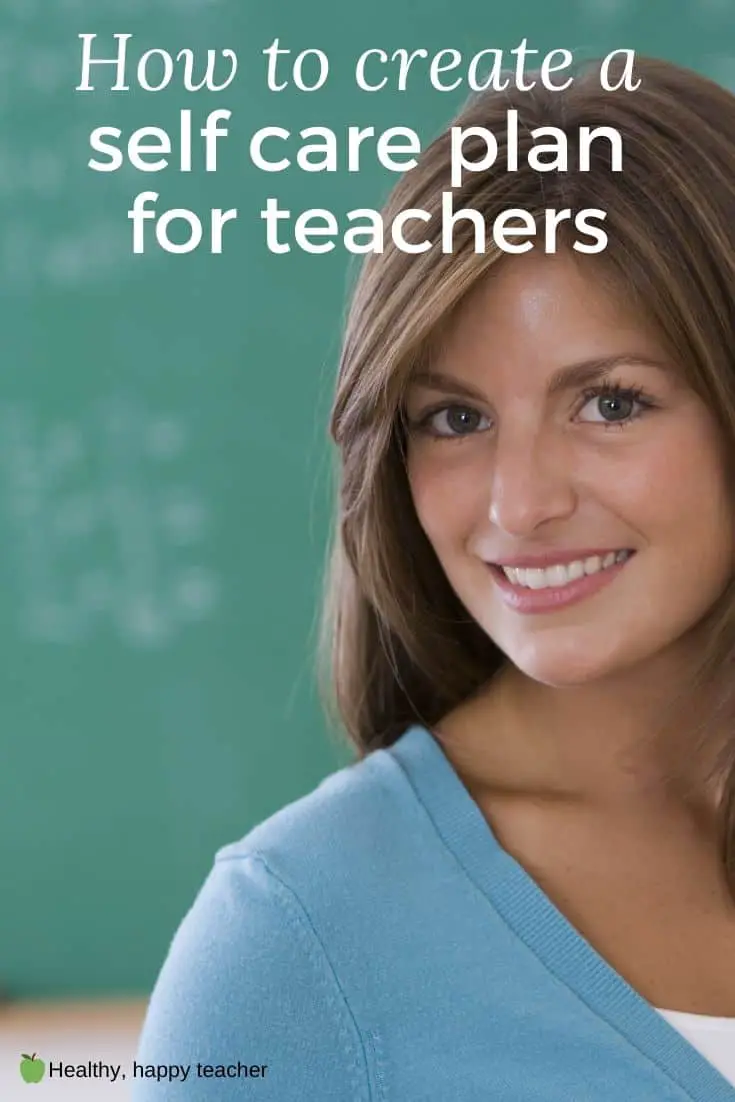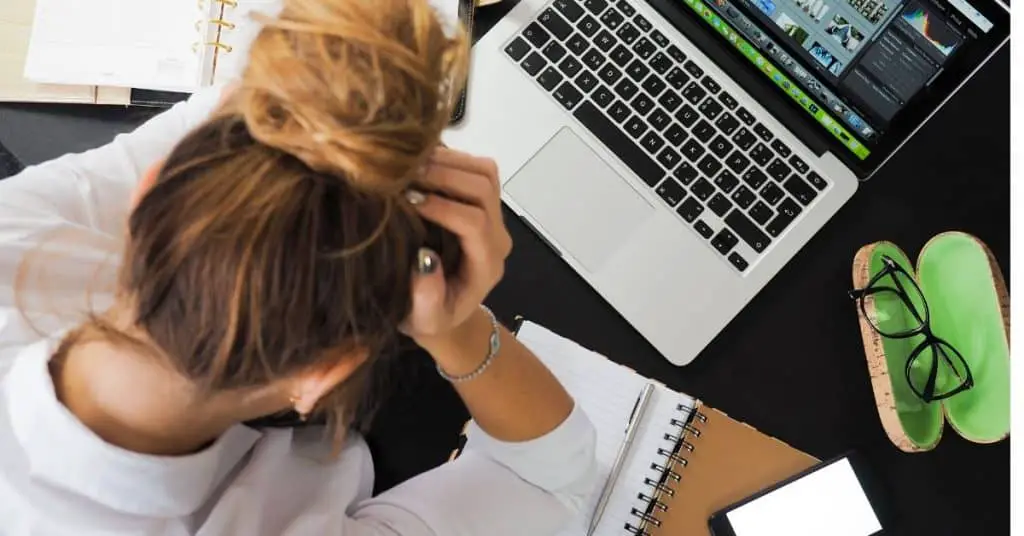If you’re feeling overwhelmed and burned out and like everything you’re doing is for the benefit of everyone but you, then here’s how to create a self care plan for teachers.

An unexpected confrontation with a colleague, a lesson where you finished your content but there was 15 minutes to go, or yet another day when you didn’t get to eat until after school are but three examples with three very different causes of things that can affect your sense of well-being.
And while it’s true that some things can catch us from left field, it’s also true that we are able to purposefully strengthen ourselves through acts of deliberate self care so that when these things DO happen, we bounce back from them quickly.
Creating a self care plan is therefore a worthwhile exercise for every teacher.
You can kick-start your self care by taking this self care challenge for teachers.
The process for creating your self care plan is to
- understand what self care is and isn’t
- analyzing your current practice on key areas of self care
- identifying gaps in your practice
- selecting self care activities to fill those gaps
- creating a new routine for these activities
- creating an emergency self care plan
Tip: This book is great for busy teachers looking for a self care plan! It offers a guided 180-day plan for teacher self care.
Here’s how to create an individualized self care plan that is unique to you.
Table of Contents
What self care is and isn’t

If you’re not overly familiar with self care then you could be easily forgiven for thinking self care means getting a manicure, having a long bath with candles, and snuggling on the couch to watch a season of The Crown while eating a block of chocolate.
While those activities may have their place, the key thing to remember is that self care is not self indulgence.
Self care is looking after yourself in the key areas of your life so that you first become and then remain a well-functioning, healthy and happy human being.
These areas include the physical, spiritual, emotional professional, psychological, and relationship aspects.
Self care is therefore also not engaging in activities that decrease your functioning. That’s self sabotage, which is something we can all be too good at!
What’s your current practice?

In creating your self care plan for teachers, the next step is to see where you already are on those key areas of self care that I identified above.
Grab a pen and some paper and get started.
Physical self care
What do you do right now to take care of your physical self?
In answering this question, think about the following
- your sleep habits
- your eating habits (type of food, when and how you eat)
- your exercise habits
- your hydration habits (how much water are you having a day)
Are there any activities you are engaging in that are negatively affecting your physical self?
Here think about your drinking, use of over the counter medication or other substances that might provide temporary “relief” but whose use above recommended guidelines is harmful to you.
Spiritual self care
What do you do right now to take care of your spiritual self?
If you are struggling to think of what this looks like beyond Christianity, to me having a spiritual life means having a sense of meaning and connection that is bigger than yourself and engaging in practices which engender this.
In answering this question, think about the following:
- do you practice gratitude?
- do you meditate?
- do you pray?
- do you attend a place of worship?
- do you connect with nature?
Emotional self care
What do you do right now to take care of yourself emotionally?
In answering this question think about
- how you express your feelings
- your use of affirmations
- your use of journaling
- your use of positive self talk
- who you turn to for support when required (can be personally and professionally)
Are there any activities you engage in that are negatively affecting your emotional self?
In answering this think about negative self talk, patterns of thinking (or overthinking), ruminating on conversations with colleagues, parents and students.
Work self care
What do you do right now to take care of your professional self?
In answering this question, think about the following:
- is your work meaningful to you?
- do you have routines to create boundaries between work life and home life?
- do you have three people you can offload to at work?
- do you have connections with people at work?
- do you find your work challenging?
- can you see a pathway or future for yourself at work?
Are there things you are doing that are making it harder for yourself with your work life?
These things can include poor time management, checking emails all the time, not taking breaks and so on.
Psychological self care
What do you do right now to take care of yourself psychologically?
In answering this question, think about the following:
- do you have a hobby you enjoy?
- do you set goals and work towards them?
- are you developing new skills?
- do you set intentions for your day and work towards them?
- do you practice reflection?
Relationship self care
What do you do right now to take care of yourself in your relationships?
In answering this question, think about the following:
- do you do date night with your partner?
- do you spend intentional time with your children?
- do you connect with people outside of your household regularly?
- do you engage in community activities?
What are the gaps in your practice?

Now there is no way one person could give positive responses to all of the questions asked above. We only have 24 hours in a day after all.
However this is what I personally aim to have as a baseline:
- physically – enough water, good food, adequate sleep and regular exercise being part of my every day life
- spiritually, emotionally and psychologically- I practice the Miracle Morning five days a week so this ticks off my meditation, affirmation, journaling and reading personal growth material
- work – I am lucky enough that my work is very meaningful and fulfilling to me (in addition to this website, I also run another successful website for women) that also provides me with unlimited potential for growth
- with relationships – intentional connections in my home once a week (that’s date night) and out of my home once a month (can you tell I’m an introvert?)
You will know what feels right for you. However note down on your self care plan what aspects of your life need work and some ideas for more specific areas within these.
Select self care activities to fill the gaps

Now you know what aspects of your life need some focus, then it’s time to brainstorm what maintenance activities you could add to your schedule to make up the gaps.
I suggest you start off by writing down the thought of everything that appeals to you.
When we get down to creating a routine you can start off by adding one thing a day and incorporating it for a week before you add something else.
If there’s nothing springing to mind, here’s 134 ideas you can check out for your self care plan.
Your maintenance self care plan

Now it’s time to develop a self care routine. These are the things you are going to do every day as a preventative practice.
You want to have habits locked into your daily and weekly practice.
For example
- before school
- between classes (if you teach at high school)
- at lunch
- after school
- in the evening
As I mentioned above, I do the Miracle Morning five days a week (Monday to Friday). I get up just after 5.00am to make this work. This covers the spiritual, emotional and psychological areas of my life.
Between teaching, you could take one minute to practice mindful breathing (emotional).
At lunch you could go for a 15 minute walk with a colleague (physical and relationship).
After school you could sit in your car in the garage, close your eyes and set your intention for how you want to be with your family when you walk in the door (work, psychological and relationship).
In the evening you could set an alarm for when you must stop doing work (work).
Weekly, you can bring in date night, dates with your kids and so on.
You can see from the above that many of the activities I’ve suggested cover more than one area. I call this self care bundling and it’s a great way to meet your needs in an effective and efficient way.
This is a super exciting thing to do and it’s tempting to go all out and try to start everything at once. But remember my suggestion above about bringing things in slowly. The most sustainable change is that which occurs gradually and then builds upon itself.
Create an emergency self care plan

Right back at the beginning you assessed your current strategies and at that point I also asked you to consider what you were doing that could be making things worse for yourself.
We all have those days when everything that can go wrong does.
This is when it can be tempting to reach for those “coping” strategies like too many drinks, too much junk food, too much binging of shows. Even lashing out at your partner or kids is a misguided coping strategy designed to remove your feelings from their source.
Go back through those aspects of your life and write down one activity you could do for each if things got overwhelming for you and you were in need for some emergency self care.
This could be:
- going for a run
- doing yoga
- cooking a healthy and delicious meal
- writing down five things you are grateful for
- putting away your computer and phone and put your schoolbag in the car (or even leave it at school if things go bad when you’re at work)
- going with your husband to your favorite cafe for dessert
- calling a friend
The next time you’re tempted to engage in a practice that doesn’t serve you, look at this list and doing one of these activities instead.
Teaching is a professionally and personally demanding job.
It requires that we give a lot of ourselves and as a consequence our own wellbeing can suffer.
It takes a deliberate plan of action to stop this from being the case.
Creating a self care plan that works on two levels – both for maintenance, so you’re better equipped to deal with it when times are tough, and also for emergencies – so you don’t make things worse – is a proactive and positive thing you can do for yourself.
Why not grab a pen and create your own self care plan right now?
Future you will thank you for it!

I’m going to create a self-care plan to make myself accountable for taking care of me!
That’s great, good luck Pamela!